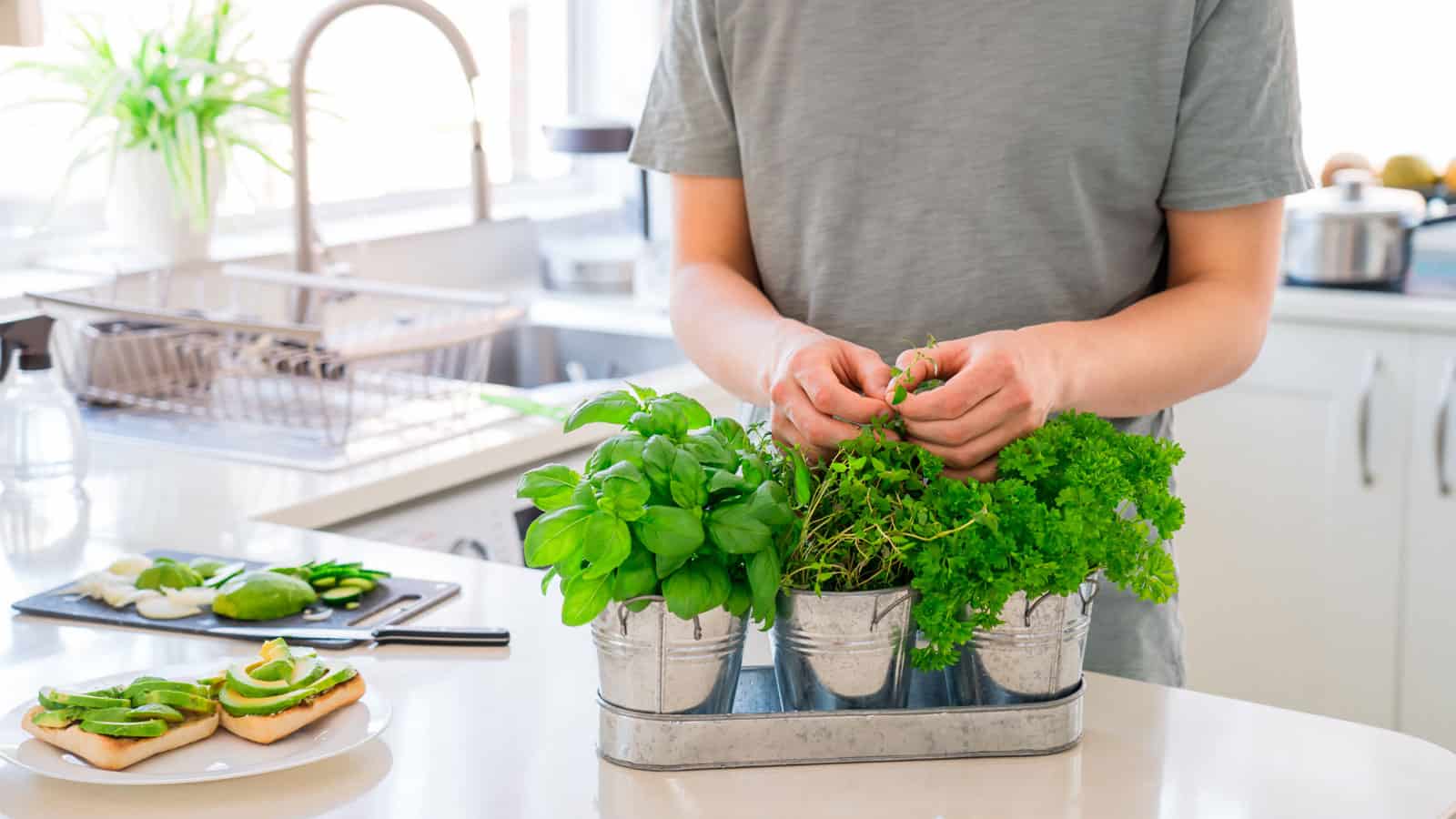Do you have an herb garden in your kitchen? Perhaps you're considering starting one, but did you know there are potential environmental hazards in your kitchen that could harm your herb plants?

This quick guide will teach you six common kitchen hazards that could be quietly working against your herb garden.
Let's ensure your herbs live their best from the air your plants breathe to the ground they grow in! Here's what to watch out for:
- Poor air circulation
- Chemical cleaning agents
- Watering issues
- Pest
- Competing plants
- Cooking fumes and smokes
Explore these challenges further and discover tips to ensure your kitchen herb garden remains healthy and vibrant!
1. Poor Air Circulation
Poor air circulation can be a significant problem when growing herb plants in your kitchen.
This is because stagnant air can lead to the buildup of harmful pollutants and chemicals that can harm your plants. Here are some familiar sources of poor air circulation in the kitchen:
Kitchen Ventilation
Adequate ventilation in your kitchen is crucial for maintaining a healthy environment for your herb garden.
Cooking, a frequent activity in kitchens, can release numerous pollutants into the air, which can be particularly problematic in poorly ventilated spaces.
Additionally, it's essential to keep air vents unobstructed. Blocked vents, often caused by furniture or other objects, hinder proper air circulation, accumulating harmful pollutants and chemicals.
Closed Windows
If you never open your kitchen windows, it can lead to poor air circulation. This is because fresh air cannot enter your kitchen and circulate properly.
To improve air circulation in your kitchen, try opening windows when possible, using exhaust fans when cooking, and keeping air vents unobstructed.
You can also use air purifiers to help remove harmful pollutants and chemicals from the air. Improving air circulation in your kitchen can help ensure your herb plants stay healthy and thrive.
2. Chemical Cleaning Agents
Common kitchen cleaning agents like bleach and ammonia can threaten plants due to their chemical content.
Bleach, containing sodium hypochlorite and ammonia, found in many cleaners, is particularly harsh and can damage plant leaves and roots.
When using these, ensure good ventilation and avoid direct contact with your herbs. Alternatively, opt for natural cleaners like vinegar, baking soda, and lemon juice, which are plant-safe and equally effective.
3. Watering Issues
Overwatering can lead to root rot and other fungal diseases, while underwatering can cause plants to wilt and die. Here are some common watering issues to watch out for:
Inconsistent watering
Herbs prefer consistent moisture levels, so watering them regularly is essential. If you let the soil dry out completely, the plants may become stressed and wilt.
On the other hand, if you water too frequently, the roots may become waterlogged and begin to rot. Water your herbs when the top inch of soil feels dry to avoid these issues.
Overhead watering
Overhead or watering from above can lead to fungal diseases and other problems. When water droplets sit on the leaves and stems of plants, they create a moist environment perfect for fungal growth.
Instead of overhead watering, try watering your herbs from the bottom up. Place the pots in a tray of water and let the plants soak up the water through the drainage holes in the bottom of the pot.
4. Pests
Your kitchen herb garden may face threats from common pests such as aphids, spider mites, and whiteflies. These pests, while small, can cause significant damage by sapping vital nutrients from the plants.
Aphids often target the stems and undersides of leaves, spider mites create delicate webs and drain the plants, and whiteflies lead to yellowing or wilting of leaves.
Regularly inspecting your plants, maintaining proper watering, and ensuring good air circulation are vital preventive measures.
If infestations occur, natural treatments like neem oil or insecticidal soaps can effectively manage these pests, helping keep your herb garden healthy and thriving.
5. Competing Plants
When you have herb plants in your kitchen, you must be aware of other plants competing for resources.
Invasive plants like the rose of sharon can quickly take over and outcompete your herb plants. It is essential to identify and control these plants to ensure the health and growth of your herbs.
Explore the truth about the Rose of Sharon's root system in our comprehensive article: Does Rose Of Sharon Have Invasive Roots? to understand whether this plant is a safe choice for your garden.
6. Cooking Fumes and Smoke
When cooking, especially with oils at high temperatures, smoke, and fumes are released.
The tiny particles in cooking fumes can clog the pores of herb leaves, hindering their ability to breathe and perform photosynthesis. This can lead to stunted growth or even the death of the plant.
Wrapping Up
Your kitchen herb garden faces several environmental hazards that need your attention. Every detail matters in maintaining a healthy garden, from ensuring proper air circulation to using suitable cleaning agents.
Be mindful of watering practices to prevent over or underwatering issues, and stay vigilant against pests that can damage your herbs.
Remember to manage space and resources effectively, especially if other plants are nearby. By addressing these six key areas, you can help your kitchen herb garden survive and thrive!
Elevate your kitchen with the magic of greenery by reading our article, Year-Round Indoor Herbs For Zone 2: A Guide For Kitchen Gardeners, and transform your culinary space into a haven of fresh flavors and aromas!
